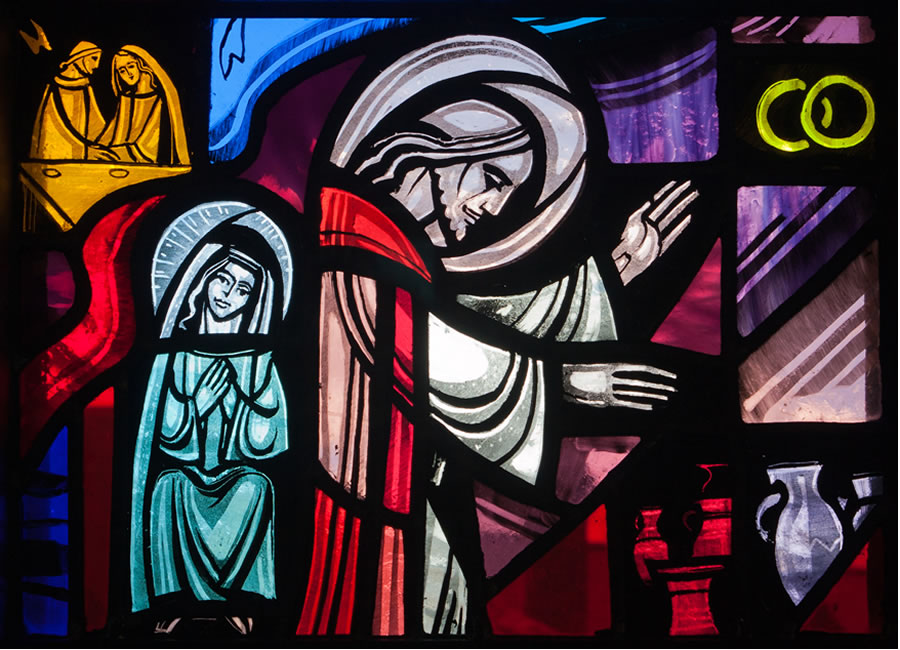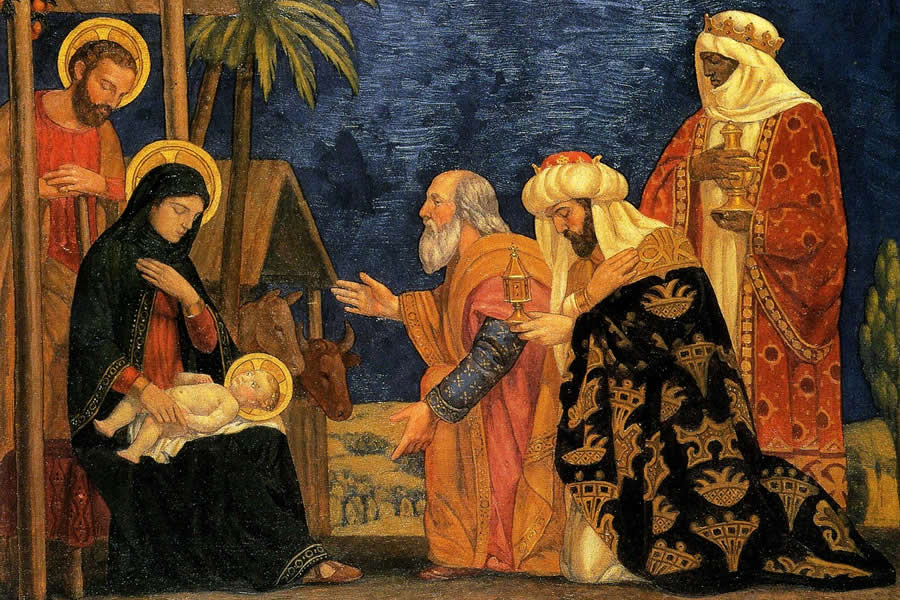St. Francis of Assisi Weekly Reflections
Readers
01-27-2019Liturgy CornerCopyright © 2001 Resource Publications, Inc.At Mass, the reader proclaims the readings that precede the Gospel. A person does not need to be an ordained deacon or priest to serve as reader at Mass. The reader sometimes joins the entrance procession. If there is no deacon, the reader carries the Book of Gospels.
Readers exercise their ministry at the ambo. After the opening prayer, a reader moves to the ambo for the first reading. If there is no cantor, the reader may recite or sing the psalm. This responsorial comes from the Scriptures and may be considered a reading like the others. If there is a second reading, another reader may proclaim it. After the homily, if there is no deacon, the reader may announce the intercessions. The entire ministry of the reader takes place during the Liturgy of the Word.
READ MORE
Today this Scripture Passage is Fulfilled
01-27-2019Weekly ReflectionWe Celebrate Worship Resource, Vol. 44, No. 1How are your New Year’s resolutions going? It’s been nearly a month now. Have you been faithful to them? Did you make any in the first place? Are you ready to weep now, as the assembly in the first reading did, because you’ve fallen short or you find them too difficult? New Year’s day is an opportunity to change our habits. Ezra offered an opportunity to the people of Jerusalem by reading to them from the law. They had returned after generations in exile, so living according to the law new to them. It was an opportunity to use guidance from God to live justly and virtuously, but it may have been overwhelming because it was new to them. Ezra had to encourage them to rejoice. Centuries later, the passage Jesus found in the synagogue provided a lot to be joyful about: glad tidings for the poor, liberty to captives, sight to the blind, freedom to the oppressed. What was new in this case was revealed when he told them, “Today this Scripture passage is fulfilled in your hearing” (Luke 4:21). Now Jesus’ ministry had begun. Jesus gave them—and gives us—a new opportunity, a new beginning, a new year, in fact, “a year acceptable to the Lord” (Luke 4:19).
How can you make 2019 a year acceptable to the Lord?
READ MORETime to Accept Responsibility
01-27-2019Question of the WeekReading I Nehemiah 8:2-4a, 5-6, 8-10 - Ezra reads the law
Reading II 1 Corinthians 12:12-30 - Analogy of the body
Gospel Luke 1:1-4; 4:14-21 - Beginning of Jesus' preaching
Key Passage Jesus unrolled the scroll and found the place where it was written: “The Spirit of the Lord is upon me, because he has anointed me to bring good news to the poor” (Luke 4:17b–18a).
Adults: What do you believe that the anointing you received at baptism requires you to do?
Kids: What could you do this week for someone who has less than you?
READ MOREThinking of Others
01-20-2019Question of the WeekReading I Isaiah 62:1-5 - Jerusalem the Lord's bride
Reading II 1 Corinthians 12:4-11 - Variety and unity
Gospel John 2:1-11 - The wedding at Cana
Key Passage When the wine gave out, the mother of Jesus said to him, “They have no wine.” (Jn. 2:3)
Adults: When have you stepped in, as Mary did at Cana, to try and make a difficult situation easier for someone?
Kids: What can you do this week to help make someone's job a little easier?
READ MORE
Fill the Jars with Water
01-20-2019Weekly ReflectionWe Celebrate Worship Resource, Vol. 44, No. 1Changing water into wine at the wedding at Cana is registered as Jesus’ first miracle, but John does not refer to these acts as miracles. He calls them “signs,” for they are performed in order to reveal God’s presence in human history. What does this sign reveal? Let’s look at the first reading for a clue. Isaiah used wedding imagery (“as a bridegroom rejoices in his bride”) and the metaphor of a marriage (“makes your land his spouse”) to describe God’s relationship to humanity (Isaiah 62:4, 5). God and humanity are united as in marriage. A covenant, a bond, has been established. In the Gospel, Jesus transforms water, which guests use to celebrate the wedding (for ceremonial washings), into wine, which guests use to celebrate the wedding. We will see wine again when Jesus’ hour truly comes: at the Last Supper, where it becomes his blood, and on the cross, where he drinks fully from the cup he cannot let pass, the cup of salvation. Jesus is actually the bridegroom, sent by God to humanity, which is the bride. Today and every Sunday, we come together to celebrate this bond and to drink the wine, the good wine, from the cup of salvation.
If the Church is the bride of Christ, how is the Mass like a wedding?
READ MOREPriest
01-20-2019Liturgy CornerCopyright © 2004 Resource Publications, Inc.The priest is the minister who offers the sacrifice of the Mass in the person of Christ (General Instruction of the Roman Missal 93). He stands at the head of the assembly, “presides over their prayer, proclaims the message of salvation to them, associates the people with himself in the offering of sacrifice through Christ in the Holy Spirit to God the Father, gives his brothers and sisters the Bread of eternal life [and the cup of salvation], and partakes of it with them.”
Christ is the one high priest. When we celebrate Mass, we participate in his one sacrifice. The local priest in our churches leads the people in the person of Christ. In most parishes, the priest leads the people in many other ways, too. He guides their spiritual lives. He meets with them on parish business. He represents them to the broader community. At Mass, he presides over their prayer.
READ MOREPleasing to God
01-13-2019Question of the WeekReading I Isaiah 42:1-4, 6-7 - The servant of the Lord
Reading II Acts 10:34-38 - Peter's discourse; the good news of peace
Gospel Luke 3:15-16, 21-22 - Baptism of Jesus
Key Passage And a voice came from heaven, “You are my Son, the Beloved; with you I am well pleased.” (Luke 3:2)
Adults: Do you think that God was "well pleased" by your actions in recent weeks? Why?
Kids: What good thing could you do this week that would be pleasing to God?
READ MORE
The Transformative Power of the Holy Spirit is Within You
01-13-2019Weekly ReflectionWe Celebrate Worship Resource, Vol. 44, No. 1The Holy Spirit has the power to transform the world and our lives in it. No matter which readings are chosen for today’s liturgy, we witness God’s power to transform. Isaiah, writing while the Israelites were living in exile, foresees a time when “every valley shall be filled in, every mountain and hill shall be made low,” transforming the world around them (Isaiah 40:4). Later, he says God’s chosen one will “bring forth justice to the nations,...open the eyes of the blind,...bring out prisoners from confinement,” transforming the lives of those in need (Isaiah 42:1, 7). Peter speaks in the house of Cornelius, the first Gentile convert. “God shows no partiality,” Peter says, transforming the outreach of the nascent Christian community (Acts 10:34). Paul writes to Titus that through Baptism and the Holy Spirit, we “become heirs in hope of eternal life,” transforming what happens after we die (Titus 3:7). In the Gospel, John promises that Jesus would baptize “with the Holy Spirit and fire,” transforming their lives (Luke 3:16). Indeed, if we have been baptized, we have the transformative power of the Holy Spirit within us.
How will you use that power to transform the world around you?
READ MOREBaptismal Certificate
01-13-2019Liturgy CornerCopyright © 2002 Resource Publications, Inc.After you were baptized, your name was inscribed in the baptism register of the Catholic parish where the event took place. Your entry also includes the names of the minister, your parents (if you were a child when baptized), your godparents, the place and date of your baptism and the place and date of your birth. You or your family probably received a record of that entry in a document commonly called a baptismal certificate. The certificate is your copy of the official record held at your parish of baptism.
READ MOREEpiphany Chalk
01-06-2019Liturgy CornerFr. Paul Turner, © 2001 Resource Publications, Inc.Some Christians bless their homes on Epiphany each year. With chalk, they write an inscription on the inside lintel above the door. The series of numbers, letters and crosses changes only slightly from year to year. For example, at the start of the year 2019, the line will read as follows: 20+C+M+B+19.
The four digits designating the new year appear at the beginning and end of the line. In 2019, for example, the last number changes to a 9. Because Epiphany comes so near the beginning of the new year, the numbers represent an annual renewal of God’s blessing. The letters have two meanings. They are the initials of the traditional names of the magi: Caspar, Melchior, and Balthasar. They also abbreviate the Latin words “Christus mansionem benedicat.” “May Christ bless this house.” The letters recall the day on which the inscription is made, as well as the purpose of blessing.
READ MORE
Rise Up in Splendour: Your Light Has Come
01-06-2019Weekly ReflectionWe Celebrate Worship Resource, Vol. 43, No. 3Wonder upon wonders, ever more wondrous. The readings today are like that, revealing greater and greater wonders as they go. The excitement is evident from the start of Isaiah exhorts, “Rise up in splendor, Jerusalem! Your light has come, the glory of the Lord shines upon you” (Isaiah 60:1). Jerusalem is portrayed as a beacon for all nations, as certainly it wanted to be at the time, welcoming its people from exile. In the second reading, we hear that “the mystery was make known...that the Gentiles are coheirs, members of the same body” (Ephesians 3:3, 6). This was truly Saint Paul’s guiding mission—to bring Christ to all people. There are no foreigners in Christ. In the Gospel, the magi receive more than one epiphany as they follow a new star, which ancients believed appeared at the time of a ruler’s birth. First, “overjoyed at seeing the star,” they recognized the kin in the baby Jesus (Matthew 2:10). Then they realized that Herod should not be told, giving the Holy Family an opportunity to escape. From the light of Jerusalem to the star over Bethlehem, the glory of the Lord shines forth.
Where can you see the light in the world and in your life today?
READ MOREOvercoming Jealousy
01-06-2019Question of the WeekReading I Isaiah 60:1-6 - Glory of the new Zion
Reading II Ephesians 3:2-3a, 5-6 - Commission to preach God's plan
Gospel Matthew 2:1-12 - The visit of the magi
Key Passage Then Herod sent the [magi] to Bethlehem, saying, "Go and search diligently for the child; and when you have found him bring me word so that I may also go and pay him homage." (Matthew 2:8)
Adults: When have you been jealous or fearful of another person? When are such feelings harmful?
Kids: When have you been jealous because something good happened to another person instead of you? What is the problem with feeling that way?
READ MORE